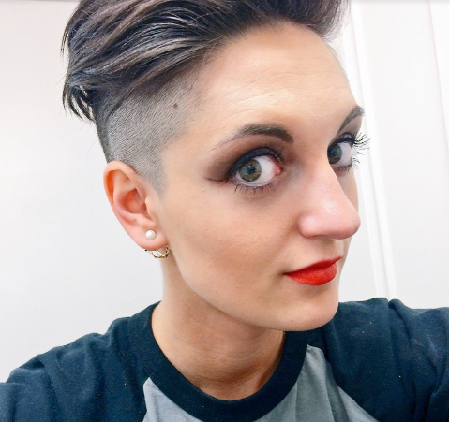Adjusting to Life on Campus: Developing an Academic Identity

Our next student story about overcoming first-year struggles while getting used to life at Southern Vermont College comes from Morgaine Segura (Class of 2016), Managing Editor of The Looking Glass. “Adjusting to Life on Campus” is Morgaine’s creation, and I am pleased to present you with Morgaine’s story as our third story in this series:
“I moved to Vermont in the fall of 2013 after a summer of waiting tables in Ecuador. My partner and I lived, thought, and felt in Spanish. We would stay up late laughing; dancing our way through the nuances of a life overlooking Parque Calderon.
A year earlier we drank Jack and Coke’s in St. Louis while mechanics repaired the transmission of my ‘97 Kia Sportage. Through the clouds of smoke in the VFW, my grandfather told me about Southern Vermont College.
I never thought I would go to college. No one did. I dropped out of high school, then I dropped out of alternative high school. My parents agreed to pay for my attempt at an online associates degree because they were sure they wouldn’t be paying for the two full years. I have never finished anything in my life, so the lack of confidence was justified. And technically, they were right, I did not graduate with a degree in database administration.
After a year spent building the confidence to apply to SVC and waiting for a response, I found out I was accepted. I dismantled the life I built in Houston over a year, used my tetris skills to tightly pack that life into the Kia, and I went.
Three days before classes began, I arrived in Bennington.
One day before classes began, I found out about the other women.
I was split. Divided. In Vermont, studying; in England, fighting for my partner.
I was alone here. I didn’t know anyone except for my grandfather who, for most of my life, only existed as a signature on the annual Christmas check.
I developed a few coping strategies to suppress the building depression.
I avoided people. I would go for days without any human contact. I worked to convince myself and others I was okay with sticking out. I felt so different. I disconnected from the other students to protect myself from feeling like an outcast. I hid to avoid the risk of being rejected or hurt by this new community.
I started working, a lot. I worked exhaustively on school work so I would not suffocate under the weight of free time. I did all I could to avoid and deny feelings of seclusion. I made sure I was too busy to be lonely. When feelings of distrust, jealousy, and insecurity consumed me, I drank them away.
And that’s how it was for a while.
I used algebra problems and research papers as distractions in the beginning. I’d do the even and odd numbered math problems; for one 8 page paper I was assigned, I wrote 27. It was out of control.
Who knows, maybe I developed academic Stockholm Syndrome, but at some point, I stopped studying to distract myself and I started to write and learn because I enjoyed it. I began to develop an identity as an academic. I found other people who really enjoyed writing and learning.
I excelled in classes, the professors and intellectually minded students actually seemed to like me. It got easier. I didn’t feel alone. I became a part of an academic community; I have never felt so at home as I do in my role as a student.
In May, I will dismantle a life built at Southern Vermont College, tightly pack that life, with two degrees and sense of self, into a Honda Fit, and I will go.
When life is difficult, take solace– strength finds itself in adversity.”
Morgaine found her place at SVC through her academic community. How did you find yours? If you have a story about adjusting to college life that you’d like to share, email Morgaine Segura at [email protected].






